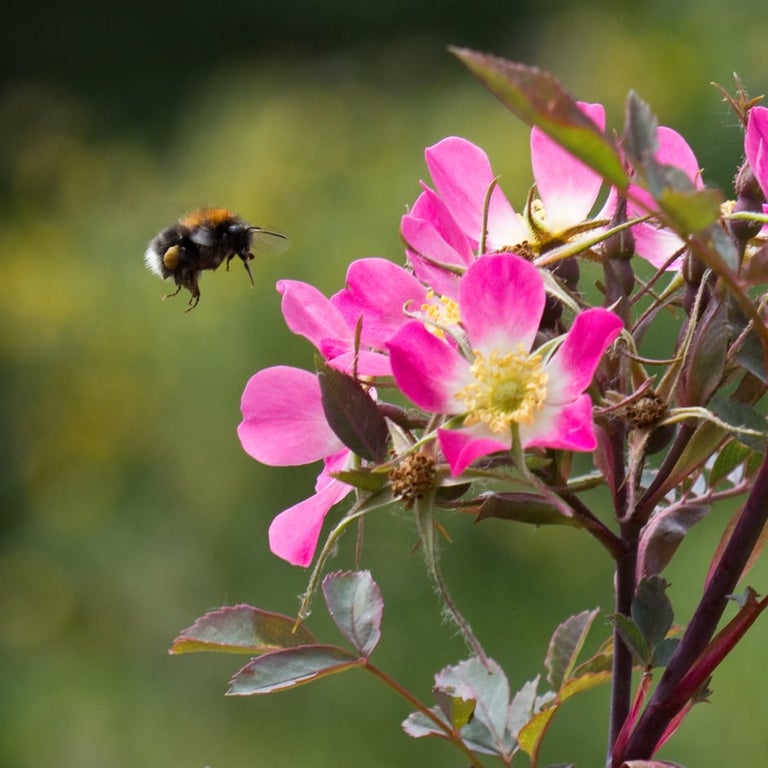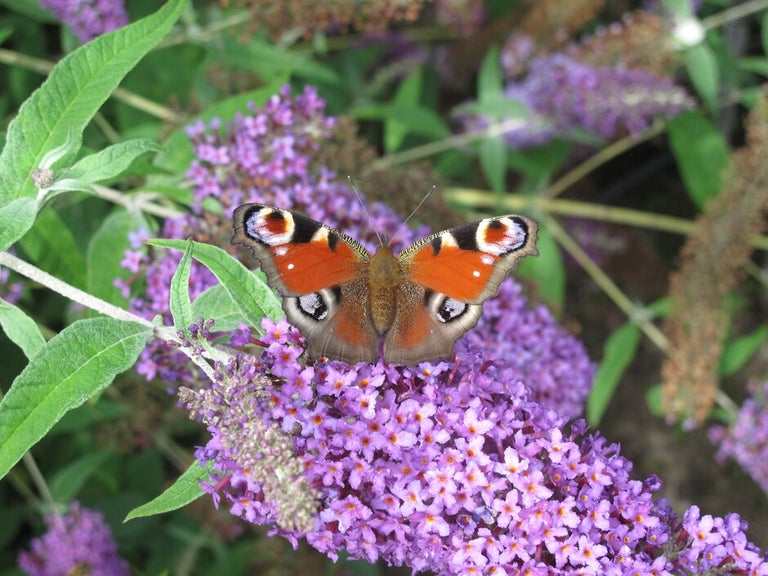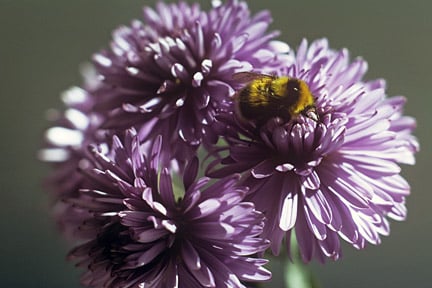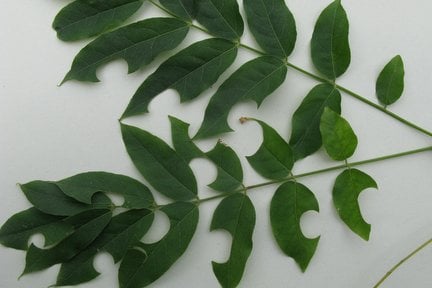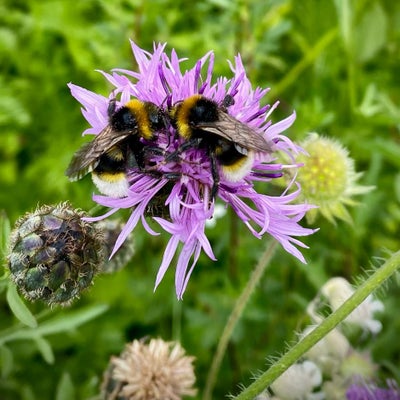
Quick facts
Five steps to support pollinators in gardens:
Fill gardens with RHS Plants for Pollinators plants
Allow lawn ‘weeds’ to flower by cutting less often
Provide water for pollinators
Avoid using pesticides and never spray open flowers
Provide nest sites for wild bees and habitats for other pollinators
What is the situation with pollinators?
The RHS is extremely concerned about pollinator declines and encourages gardeners to continue to support these vital insects. There are many factors likely to have caused these declines, including the lack of flowering plants, loss of nesting sites and other habitats, as well as climate change, pests and diseases. Much of this has been linked to modern farming practices and other land use changes.
Find out more about pollinator decline.
How gardeners can help bees and other pollinators
Due to the rich diversity of plants growing in Britain’s gardens, these outside spaces, and the gardeners who tend them, are critical to support a wide range of pollinators. There can be more pollinators in our nation’s gardens than in surrounding agricultural land. There is though always space for more pollinators in our gardens.
Here’s how you can do more to support pollinators in your garden, outside space or community:
- Nectar and pollen rich plants are crucial to support our pollinators; fill gardens and other ornamental plantings with a range of plants from the RHS Plants for Pollinators lists.
- Allowing lawn ‘weeds’ to flower by mowing less often provides valuable extra recourses from areas that are often free of flowering plants.
- Provide water for pollinators. Bees and other pollinators sometimes need to drink; having a shallow margin of a pond or a shallow dish filled with stones or marbles filled with water will provide a safe source of water.
- Avoid using , never spray open flowers and always read and follow label instructions. Accepting the presence of some ‘pests’ can help a natural balance in the garden and provide larval food for pollinators; for example, aphids are food for many species of hoverfly larvae. Preventing and reducing pests and diseases outbreaks by good cultivation, selection, and using biological control should always be the first line of control. If pesticides must be used, consider using short-persistent organic products which can give effective results.
- Provide nest sites for wild bees; either make your own or you can purchase nests for solitary bees. Some solitary bees nest in the ground, either in bare soil or short turf. They will find their own nest sites, so tolerate the small mounds of soil deposited by the female bees when they excavate their nest tunnels. Purpose-built bumblebee nest boxes often go unused. Instead bumblebees often prefer to nest in holes in the ground, for example under hedges with plants along the base. One species, the tree bumblebee, often uses bird nest boxes. Many types of pollinator have very different habitat and food requirements to adults. For example, many hoverfly larvae feed on aphids (greenfly and blackfly) and the larvae of butterflies and moths feed on plants. Accepting some holes in leaves and the presence of aphid prey can help boost pollinator numbers.
Gathering information on the status of pollinators is vital in efforts to understand what is happening to their populations and to conserve them – the UK Pollinator Monitoring Scheme (PoMS) aims to establish how pollinator populations are changing in Britain.

RHS Plants for Pollinators
In November 2014 the UK Government launched the National Pollinator Strategy (England). The RHS is a key stakeholder of the Strategy, which sets out actions and goals to support pollinators and try and answer some of the questions surrounding causes of pollinator declines. Part of the Strategy encourages gardeners to choose plants that provide resources for pollinators and endorses the RHS Plants for Pollinator list and logo.
One of the biggest problems for pollinators is a lack of flowering plants, especially those packed with pollen and nectar, so in 2011 we launched the Perfect for Pollinators logo to encourage gardeners to grow more of them. We care passionately about our bees, hoverflies, butterflies and other pollinators and believe gardens play an important role in reversing their decline. The brand has never resulted in any profit for the RHS.
We have been reviewing the logo after research found that some labelled plants contained traces of . While the RHS encourages responsible growing practices, it cannot, as a charity, police how hundreds of thousands of plants are grown each year within the horticultural trade. Rather than get rid of the brand altogether – which would undermine efforts to boost pollinator numbers – we have changed the name to Plants for Pollinators. This new name better reflects the significance of the logo; showing gardeners those flowering plants that are attractive to pollinators without commenting on the way in which they have been grown.
We anticipate that the process of rebranding may take some years as we work with the industry to ensure a smooth transition. In the interim we urge gardeners to continue to look to the logo as a guide to what plants will support pollinators in their gardens as we must continue to help these vital insects.
We advise our hundreds and thousands of members and millions of other gardeners, to avoid using pesticides. We urge anyone using pesticides to proceed with caution and never spray open flowers.
Pesticide-free plant suppliers
One of the RHS’s key objectives is to help gardeners to garden responsibly and grow more plants; for instance, we promote non-chemical means of control for gardeners and provide extensive advice on alternatives to pesticides.
For those that prefer to have more confidence that the plants they purchase do not contain residues we have created a list of nurseries who grow some or all of their plants using organic principles. We are also eager to continue to work with the horticultural trade and Government to establish how assurance schemes and supply chains can be improved to help buyers and gardeners make informed decisions, such as including information at the point of sale about how plants have been grown.
National Botanic Garden of Wales ‘Saving Pollinators’
The National Botanic Garden of Wales Saving Pollinators scheme guarantees plants produced without the use of synthetic insecticides.
In summer 2020 the Saving Pollinators scheme included 23 Welsh nurseries that have signed up to not use peat or synthetic pesticides on labelled plants and to a list of plants that research at the National Botanic Garden of Wales has shown to be visited by bees (including honeybees, bumblebees and solitary bees, along with hoverflies).
Nurseries who grow using organic principles
A list of UK organic nurseries that sell organic plants online or by mail order can be found here.



